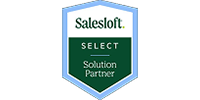Salesforce vs. HubSpot CRM: Which is Right for Your Business?
Salesforce.com revolutionized the way sales departments operate with the introduction of their CRM in 1999. In a world dominated by million dollar enterprise-level applications from providers like Oracle and Siebel (later acquired by Oracle), Salesforce provided a cost-efficient, easy to use, and quick to install CRM solution that allowed every company, no matter how large or small, to utilize a CRM. Salesforce has evolved significantly since its inception, and now operates more like an ecosystem that an entire business can run on, rather than just a CRM platform.
The HubSpot CRM was introduced at Inbound 2014, a decade and a half after Salesforce; however, many believe it has the potential to disrupt the CRM market just like Salesforce did. The simple, yet powerful CRM was built with the sales rep in mind. The most appealing feature of the HubSpot CRM is its ability to easily add contacts, log activity, send emails, and prospect new accounts. All of the tedious and time-consuming data entry tasks that sales reps hate have been automated in HubSpot’s CRM, making it an easy to use and implement CRM solution.
Before determining which CRM is right for your business, it is important to note that a CRM is not a standalone solution for sales and marketing success. In any business, you’ll need a Marketing Platform, such as HubSpot, Marketo, or Pardot, to run in tandem with the CRM and provide the tools necessary to keep a steady flow of leads entering the CRM.
We work with dozens of CRMs and other tools and platforms to make your sales and marketing teams more effective and efficient. The following are questions you should ask yourself before deciding whether to implement HubSpot CRM or Salesforce for your business. These same questions apply when selecting other CRMS, but for purpose of discussion we'll focus on HubSpot and Salesforce.
How complex is your sales process?
The HubSpot CRM, in its infancy, is not robust enough to handle complex sales processes. Unlike Salesforce, which has an expansive application marketplace and seemingly unrestricted development capabilities, HubSpot CRM is very limited in its customization at the moment. Though this will undoubtedly change in the future, HubSpot CRM simply can not handle complex sales and business processes like Salesforce can.
For organizations with simple sales processes, HubSpot CRM shines, regardless of how small or large the organization is.
What is your budget?
Although Salesforce significantly reduced the cost-barrier to CRM solutions back in 1999, today’s market offers a number of solutions for less than Salesforce. The per license fee can be cost-prohibitive for organizations that require many licenses.
HubSpot CRM, on the other hand, is completely free to use. There is currently no cost for the HubSpot CRM; however, to get the most out of it you should purchase HubSpot’s Sidekick for Business tool as it adds much needed functionality for prospecting and analytics.
What are your reporting demands?
One of the main reasons for implementing a CRM is for the reporting capacity it allows. CRMs provide insight into sales activity, pipeline, account history, and much more. However, not all CRMs are equal when it comes to reporting and tracking functions.
Salesforce.com has tremendous reporting capacity. With formula fields and bucketing capacity built right into the report builder, Salesforce allows sales and marketing professionals to build seemingly limitless reports and dashboards. The integration and custom development capacity within Salesforce allows for enterprise-wide reporting at all levels of granularity.
HubSpot CRM’s biggest weakness is its reporting capacity, or lack thereof. As of the writing of this post, there is no custom reporting feature in the HubSpot CRM; however, if you are a Sidekick for Business user you can see valuable reports on the email templates you use for prospecting.
What are your goals?
Much like any business decision, deciding on which CRM is best for your business boils down to your goals. If your goals are to create an enterprise-wide ecosystem in one platform, with ample opportunity for customization, then Salesforce is right for you.
If your goal is to implement a “lightweight” CRM that makes sales reps more efficient and allows for closed-loop reporting on sales and marketing initiatives, then HubSpot CRM is best for you.
Now that you know which questions you need to ask before selecting a CRM, click below to request a consultation and get started on a path to sales and marketing success.











